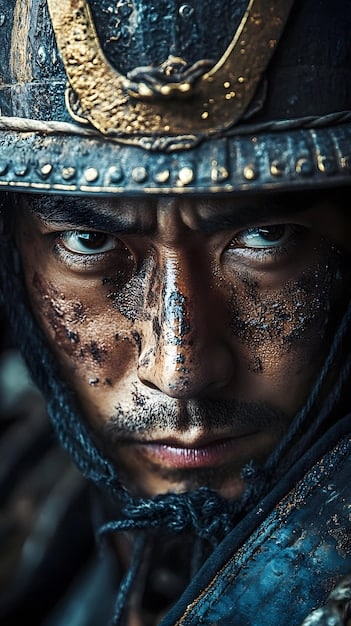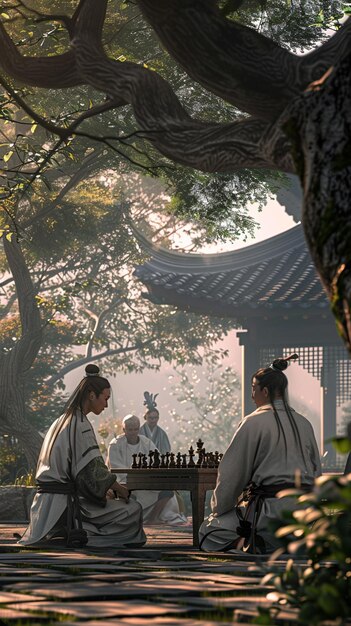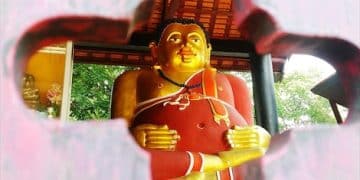Understanding the Cultural Significance of Japanese Samurai Films

Understanding the cultural significance of Japanese samurai films involves exploring themes like honor, duty, and societal change, reflecting Japan’s historical and philosophical values. These films provide insights into the samurai ethos and its impact on Japanese identity.
Samurai films are more than just action-packed historical dramas; they are cultural artifacts that offer a window into the soul of Japan. **Understanding the cultural significance of Japanese samurai films** requires delving into the historical context, philosophical underpinnings, and artistic expressions that define this unique genre.
These films not only entertain but also educate viewers about the complex social structures, ethical codes, and aesthetic sensibilities that have shaped Japanese society for centuries. By examining these cinematic masterpieces, we can gain a deeper appreciation for the enduring legacy of the samurai.
The Historical Context of Samurai Films
To truly appreciate the cultural significance of samurai films, understanding the historical backdrop against which they are set is essential. The samurai emerged as a powerful warrior class during Japan’s feudal period, shaping the nation’s political and social landscape for centuries.
Their rise and eventual decline are chronicled in these films, offering a glimpse into the tumultuous times that defined their existence. The samurai’s code of conduct, known as Bushido, emphasizes loyalty, honor, and self-sacrifice, values deeply ingrained in Japanese culture.
The Rise of the Samurai Class
The samurai class emerged during the Heian period (794-1185) and gained prominence during the Kamakura shogunate (1185-1333). Their military prowess and unwavering loyalty made them indispensable to the ruling elite. Samurai families rose to positions of power, and their influence permeated every aspect of Japanese society.
The Fall of the Samurai
The Meiji Restoration in 1868 marked the end of the samurai era. As Japan modernized, the samurai class was gradually dissolved, and their traditional roles were replaced by a modern army and bureaucracy. Samurai films often depict this period of transition, exploring the challenges faced by these warriors as they struggled to adapt to a rapidly changing world.
- The Meiji Restoration led to the abolishment of the feudal system.
- Samurai were forced to adapt to new roles or face obsolescence.
- This era is often portrayed in films as a time of great social upheaval.
The portrayal of historical events in samurai films is not always entirely accurate, but it provides valuable insights into the cultural values and collective memory of the Japanese people. These films often serve as a way to reflect on the past and grapple with the complexities of national identity.
Bushido: The Samurai Code and Its Cinematic Representation
Bushido, the samurai code of conduct, is a central theme in many Japanese samurai films. This ethical code dictates the principles that guide a samurai’s life, emphasizing virtues such as loyalty, honor, and self-discipline.
Films vividly depict these principles, showcasing the samurai’s unwavering commitment to their lord, their willingness to sacrifice themselves for the greater good, and their adherence to a strict moral code. These representations not only entertain but also reinforce these values within Japanese society.
The Core Tenets of Bushido
Bushido encompasses several key virtues, including righteousness (gi), courage (yu), benevolence (jin), respect (rei), honesty (makoto), honor (meiyo), and loyalty (chugi). These principles are often tested and exemplified in samurai films, providing dramatic tension and moral lessons.
- Righteousness: Samurai were expected to act with integrity and justice.
- Courage: They were encouraged to face any challenge without fear.
- Honor: Samurai valued their reputation and would die to protect it.
Cinematic Interpretations of Bushido
Films often explore the complexities and contradictions of Bushido. While some characters embody the ideal samurai, others struggle with the code’s demands, highlighting the human cost of adhering to such strict principles. This nuanced approach allows for a deeper exploration of the code’s impact on individuals and society.

The cinematic representation of Bushido serves as a powerful reminder of the values that have shaped Japanese culture. By highlighting these principles, films contribute to the preservation and transmission of cultural identity across generations. **Understanding the cultural significance of Japanese samurai films** is incomplete without an appreciation for Bushido.
The Role of Honor and Duty in Japanese Samurai Films
Honor and duty are paramount themes in samurai films, often dictating the actions and decisions of the characters. Samurai are portrayed as individuals bound by a strict sense of obligation, both to their lord and to their own reputations.
Their unwavering commitment to these principles often leads to dramatic conflicts and tragic outcomes, highlighting the profound impact of honor and duty on their lives. This emphasis on honor and duty reflects the broader cultural values of Japanese society, which places a high premium on social responsibility and personal integrity.
The Concept of Giri (Obligation)
Giri refers to the complex web of social obligations that bind individuals together in Japanese society. Samurai films often depict the challenges of balancing competing Giri, such as loyalty to one’s lord versus loyalty to one’s family.
Seppuku: The Ultimate Act of Honor
Seppuku, or ritual suicide, is a dramatic example of the samurai’s commitment to honor. This act allowed a samurai to regain his honor after suffering a defeat or disgrace. While not a common occurrence, seppuku is often depicted in films as a powerful symbol of the samurai’s unwavering dedication to their principles.
- Seppuku demonstrates the importance of honor over life itself.
- It is a way for samurai to take responsibility for their actions.
- The act is often portrayed with great solemnity and respect.
Exploring how samurai perceive and act upon their notions of honor and duty is crucial for **understanding the cultural significance of Japanese samurai films**. These themes resonate deeply with Japanese audiences, reflecting a cultural emphasis on social harmony and moral responsibility.
Samurai Films as a Reflection of Japanese Societal Values
Japanese societal values are extensively reflected in samurai films, providing insights into the nation’s cultural norms and beliefs. These films often explore themes such as loyalty, respect for elders, and the importance of social harmony.
By observing how these values are portrayed and negotiated within the narratives, audiences gain a deeper understanding of the cultural forces that have shaped Japanese society. Samurai films, therefore, serve as a cultural mirror, reflecting both the ideals and the challenges of Japanese social life.
The Importance of Harmony (Wa)
Wa, or harmony, is a fundamental value in Japanese society. Samurai films often emphasize the importance of maintaining social order and avoiding conflict. Characters are frequently faced with difficult choices that require them to balance their personal desires with the needs of the community.
Respect for Hierarchy and Authority
Japanese society traditionally places a high value on hierarchy and respect for authority. Samurai films reflect this by portraying the strict social structures of feudal Japan. The relationship between lord and vassal is often central to the narrative, highlighting the importance of loyalty and obedience.

The depiction of these values in samurai films is not always straightforward. Some films critique the rigidity of social structures and challenge traditional norms. This critical perspective allows for a nuanced exploration of the complexities of Japanese societal values, adding depth to the viewers’ **understanding the cultural significance of Japanese samurai films.**
Kurosawa Akira: The Master of Samurai Cinema
Kurosawa Akira is widely regarded as one of the greatest filmmakers of all time, and his samurai films have had a profound impact on the genre and on cinema as a whole. His films are known for their stunning visuals, compelling characters, and profound exploration of human nature.
By examining Kurosawa’s contributions to samurai cinema, we can gain a deeper understanding of the artistic and cultural significance of these films. His innovative techniques and thought-provoking themes have solidified his place as a master of the genre.
Key Films by Kurosawa
Kurosawa directed several iconic samurai films, including “Seven Samurai” (1954), “Yojimbo” (1961), and “Ran” (1985). Each of these films offers a unique perspective on the samurai ethos and the challenges of living in a feudal society.
They vividly showcase how cinematic techniques can be used to evoke a strong sense of tradition, honor, and the inevitable clash with modernization. All these films add up to our **understanding the cultural significance of Japanese samurai films.**
Kurosawa’s Influence on Filmmaking
Kurosawa’s films have influenced countless filmmakers around the world. His innovative use of camera angles, editing techniques, and sound design has set a new standard for cinematic storytelling. His films have also helped to popularize samurai culture outside of Japan.
- His films have been remade and adapted in various countries.
- He has inspired generations of directors and actors.
- His influence can be seen in many modern action films.
The lasting influence of Kurosawa on the genre illustrates the powerful cultural messages that samurai films can convey. His work has not only entertained audiences but also sparked important conversations about Japanese history, culture, and identity.
The Evolution of Samurai Films: From Classic to Contemporary
From classic black-and-white films to modern blockbusters, samurai films have undergone a significant evolution over the years. While the core themes of honor, duty, and sacrifice remain central to the genre, contemporary films often explore these themes in new and innovative ways.
By examining the evolution of samurai films, we can gain a better understanding of how the genre has adapted to changing cultural landscapes and evolving audience preferences. This evolution reflects the ongoing dialogue between tradition and modernity in Japanese society.
Early Samurai Films: The Foundation of the Genre
Early samurai films, such as those directed by Kurosawa Akira, established the key conventions and tropes of the genre. These films often focused on historical events and portrayed samurai as idealized heroes. They were instrumental in shaping our **understanding the cultural significance of Japanese samurai films.**
Contemporary Samurai Films: Innovation and Experimentation
Contemporary samurai films often experiment with different genres and styles. Some films blend samurai themes with science fiction or fantasy, while others offer a more critical perspective on the samurai ethos. This willingness to push boundaries has helped to keep the genre fresh and relevant.
The continuous evolution of samurai films ensures that they remain a vital part of Japanese culture. By adapting to changing times, the genre continues to offer valuable insights into the enduring appeal of the samurai spirit.
| Key Element | Brief Description |
|---|---|
| ⚔️ Bushido Code | Samurai’s moral principles: honor, loyalty, and self-sacrifice. |
| 🏯 Historical Context | Feudal Japan period, portraying social structure and samurai’s role. |
| 🎬 Kurosawa Akira | Influential director, mastering samurai cinema with iconic films. |
| 🎎 Societal Values | Depicting respect, hierarchy, and harmony in Japanese society. |
Frequently Asked Questions
Bushido is the samurai code of conduct, emphasizing honor, loyalty, and self-sacrifice. **Understanding the cultural significance of Japanese samurai films** is essential, as many plots and characters revolve around samurai and the cultural impact of the way they live.
Kurosawa Akira was a visionary director whose samurai films redefined cinema. His storytelling, visuals, and themes profoundly influenced countless filmmakers and shaped perceptions of samurai culture worldwide.
Samurai films often showcase deeply engrained Japanese values like respect between people, loyalty, and the importance of honor. By portraying these values, the movies aid in **understanding the cultural significance of Japanese samurai films**.
Common themes in samurai films include duty, sacrifice, honor, and the struggle between tradition and modernity. These themes are consistently explored through the narratives and characters, often leading to dramatic and thought-provoking stories.
Samurai films have evolved from classic historical dramas to include science fiction and fantasy elements with samurai themes. Despite many changes, they continue to explore core themes adapt the telling to fit contemporary audiences.
Conclusion
**Understanding the cultural significance of Japanese samurai films** provides a valuable lens through which to view Japanese identity, history, and values. These films, rich with historical context, philosophical underpinnings, and artistic expressions, offer a mirror to both internal and external audiences.
Whether through the lens of Bushido, Kurosawa’s masterful direction, or the evolving narratives of contemporary cinema, samurai films continue to captivate and educate, preserving and transmitting the essence of Japanese culture to the world.





